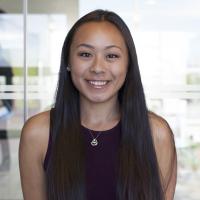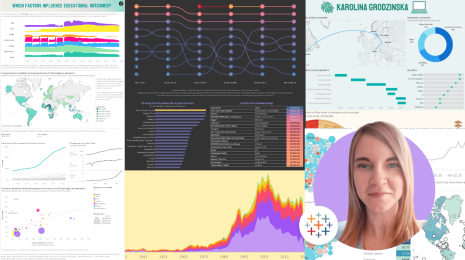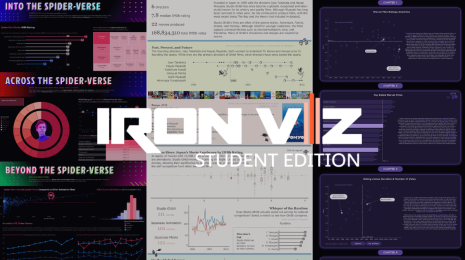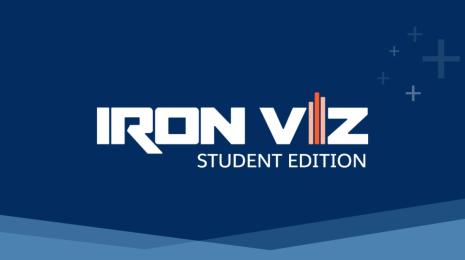Generation Data: Strong data skills helped student secure a full-time job
Hear from Tarnejah about her data journey, how learning analytics gave her a competitive edge, the magic of using a notebook, and how data skills helped her land an amazing role at executive search firm, Heidrick & Struggles.
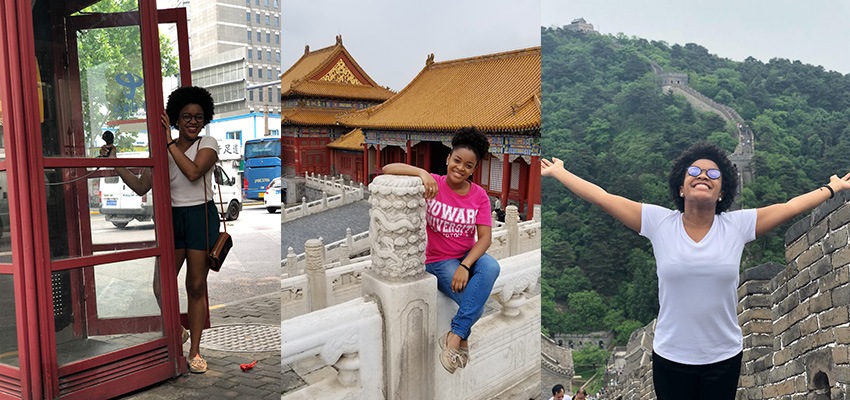
Editor’s Note: This piece is part of the Generation Data series on the Tableau blog. At Tableau, we feel that data skills are essential for the next generation of professionals and business leaders. The Tableau Academic Program seeks to arm students with the valuable analytical skills needed to think strategically and make an impact, both academically and professionally. If you are a student, download your free Tableau license today to start learning data skills.
What began as one blog post, Generation Data is now a collection of stories about our student Tableau users, hearing how students are learning data analytics for jobs and internships, interesting ways they're using Tableau, and so much more. My name is Midori Ng, and I'm on the Academic Programs team at Tableau and I had the pleasure of speaking with Tarnejah Rolfe. Tarnejah is a senior at Howard University in Washington, DC, who was part of the first cohort of Zen Master, Chantilly Jaggernauth’s Millennials and Data Program.
Read on to hear from Tarnejah about her data journey, how learning analytics gave her a competitive edge, the magic of using a notebook, and how data skills helped her land an amazing role at executive search firm, Heidrick & Struggles.
MIDORI NG (MN): We've chatted a couple times, and I really love hearing your story. Can you share a little bit about yourself?
TARNEJAH ROLFE (TR): I am a senior Computer Information Systems major at Howard University in Washington, DC. I’m originally from Dallas, Texas. My older sister attended Howard and she [is] a really big influence on my life. I saw how the school really changed and transformed the way she thought and acted. And I thought that was pretty impressive, so of course, I chose Howard as well.
MN: You’re a third-year senior which means you finishing school one year earlier than most students. Did you know right away what you wanted to major in?
TR: In high school, we had different specializations and I actually chose the information technology major to study. I had never heard of the major before I entered into that track in high school. Having the experience and knowledge I gained when I was taking different classes in high school definitely opened my eyes to Computer Information Systems at Howard. There is a lot you can do with it and I thought it was really interesting.
MN: That’s amazing! Now, when did data come into the picture?
TR: It’s interesting how it happened. The Information Systems Department at Howard hosts an annual hackathon called BisonHacks and I was a participant. There was a woman named Chantilly Jaggernauth who spoke at the event about a non-profit she founded called Millennials and Data. The program was going to be focused on [participants] learning Tableau and gaining data skills. After hearing her speak, I realized that having data analytics experience would have given my team a competitive edge at the hackathon.
MN: I've seen a lot of the buzz on Twitter about Millennials and Data, and you were actually part of the first cohort! I would love to know more about your experience there.
TR: It was a cohort of only 10 students. It was really cool because students in [the cohort] had different majors. It was eye-opening that all sorts of people were interested in data analytics. It was also a mixture of MBA and undergraduate students. It felt like, “Wow, data analytics is very versatile and you can use it everywhere.”
MN: I think it's such an interesting program—that you have 16 weeks—and you're doing this while also in school full-time. How do you stay organized?!
TR: Wow, that is an interesting question. Last semester, I was taking 19 credit hours and part of the Honors program. I was also balancing Millennials and Data and other extracurriculars. Honestly, to keep up with everything I just had to-do lists: weekly to-do lists, daily to-do lists, allocating specific times to everything. I write it all down in my notebook.
MN: (laughs) So, it’s all in the notebook.
TR: It's all in the notebook. Everything that I keep up with—all my responsibilities, of course.
MN: Here at Tableau, we have something we like to call an “a-ha” moment. This might be a time where you realized the power of data or visualizing your data. Did you ever have an “a-ha” moment?
TR: My real “a-ha” moment with Tableau was definitely when I was taking a Systems Analysis and Design class last semester, which was one of my major classes, and we were introduced to something called a Gantt chart. And I knew that I had seen that feature, that function, in Tableau before. I thought, “Okay, not sure what this is, but maybe I'll use it one day.” I took a class, we got to the first chapter, and we started going over Gantt charts. With database management and data analytics, of course, [Tableau] is a really helpful [platform] to help you plan and schedule with a team.
MN: The final project or component of Millennials and Data is taking the Tableau Desktop Specialist Certification. How did you study for it?
TR: We had class bi-weekly and basically, we were being trained for the Tableau Desktop Specialist exam the entire time. We went through the Tableau study guide [and] Chantilly actually made some quizzes for us. She timed us for each quizand [I thought], “Wow, this is kind of difficult,” at the time.
So by the time we all got to the Tableau Certification Exam, we actually had 100% of the cohort pass the exam for the Tableau Desktop Specialist. It really opened our eyes to see that we were being prepped for [it] all this time.
MN: I think there are a lot of students out there, around the world—around the country—who are really interested in learning Tableau and don't exactly know where to start. What are some suggestions that you would have for students who are interested in learning Tableau?
TR: First, of course, I would tell them to start by downloading Tableau for Students. Then I would tell them to go to two places: Tableau Public and Twitter. On Tableau Public, you can look at different visualizations people have made. On Twitter—oh my goodness—there are so many people who use Tableau that are on Twitter who can provide feedback and you can get inspiration from. That's actually where I got most of my knowledge from. Chantilly taught us that everything we would need to learn from the Tableau can come from the Tableau Community.
I would also say participate in community-led programs like Makeover Monday—we were encouraged to participate in those. There is one called Viz for Social Good. These get you different experiences with different kinds of data and maybe even teach you about life around the world.
And, of course, YouTube. A lot people have YouTube videos on basic things that you can use in Tableau. There are some things in Tableau that I taught myself that I didn't learn from anyone else. So leverage Google (laughs), leverage any resources that you could possibly have on the internet.
MN: Twitter was how we connected.
TR: Very true! I tweeted a viz I made for Makeover Monday...
MN: And a few people at Tableau flagged it for me since you made an awesome viz and are a student!
TR: The community connected us (laughs).
MN: Do you have any favorite visualizations or authors on the Tableau Public community that you follow to get inspiration?
TR: You may think this is biased, but of course, really honest and truly, two of my favorite viz authors are Chantilly Jaggernauth and, actually, one of my classmates from Millennials and Data: Joseph Perez. Let me tell you why.
Chantilly uses Tableau for a lot of different things. I know she uses it quite a bit in her career, but I like to go back and look at her visualizations from 2015, 2016 and then go look at ones from 2018 and 2019 to see the incredible progress. Chantilly has come a long way with visualization. It’s also like she uses every feature in Tableau. She's very good at using different color palettes and that really gives me inspiration on how I can do that with my own vizzes.
As for my classmate, Joseph Perez. It's like he was in an accelerated program with Millennials and Data. Joseph was just making these incredible visualizations. When we would get one set of data, he would analyze it in a way in which none of the rest of our classmates would think. Somehow he would put every single piece of data in his visualization.
They are definitely two of my favorites. I like to go and look at different featured posts every week and just see what different people are doing in the Tableau Community publishing on Tableau Public. So that's always really fun to look at.
MN: Joseph actually placed in our Student Viz Assignment Contest. Our team runs a contest twice every year, where any student can submit a visualization they made. He submitted one on Capital Bikeshare.
TR: I get a lot of ideas from Joseph—and a lot of the time, he gets his ideas from Chantilly. It's crazy.
MN: There you go. (laughs) Full circle. You're graduating this year. Congratulations.
TR: I am. Thank you.
MN: What are your plans after college?
TR: I've accepted an offer as an executive branch analyst with an executive search firm called Heidrick & Struggles. I will be back at home in Dallas, Texas, also known as a place with great weather, good prices, good food.
The role wasn't originally for someone with data analytics experience. I have very common skills, as an information systems major going into a role similar to consulting.
Having data analytics skills now set me apart when interviewing. I can turn my job into one that relies and uses my data skills.
MN: We're very excited for you over here at Tableau and want to congratulate you.
TR: Thank you very much!
MN: I have one more question to wrap up our conversation. What do you wish you had known when you started your journey with data analytics?
TR: To start, some advice that I would give to current students, especially those who are rising seniors specifically: don't stress. If you put in your work—if you continue to search for different things like what you want—they will come to you, opportunities will come. A lot of people stress about, “Oh no, I want to work for this company and I want to do this type of job.” Really honest and truly, companies want you. They want fresh minds and they want students. I think it's important that we keep in mind that the more we stress about something or the more we allow things to become stressful, the harder it really is to be able to stay guided or to stay focused. Your mind really goes to a lot places when you're stressed out, so that's one piece of advice.
To someone who hasn't found their passion yet, it is okay. Take some time, write down different things that you like to do, write down some things that you want to do, and write down things that you know that you're good at or that you have showed some expertise in.
That's something I did that my mentor helped me with at the beginning of my senior year and it really transformed the way I thought about different career tracks and everything. Basically, I took those skills that I wrote down and searched for jobs looking for these types of skills.
MN: I feel like a common thread through everything is to use a notebook. Write it down.
TR: Yes, write it down.
We hope you enjoyed going on Tarnejah Rolfe’s data journey with us, hearing about how data skills made her more competitive and created opportunities—like her upcoming job with an executive search firm.
Join the students of Generation Data and download your free Tableau for Students license today to start learning data skills.
Zugehörige Storys
Blog abonnieren
Rufen Sie die neuesten Tableau-Updates in Ihrem Posteingang ab.
